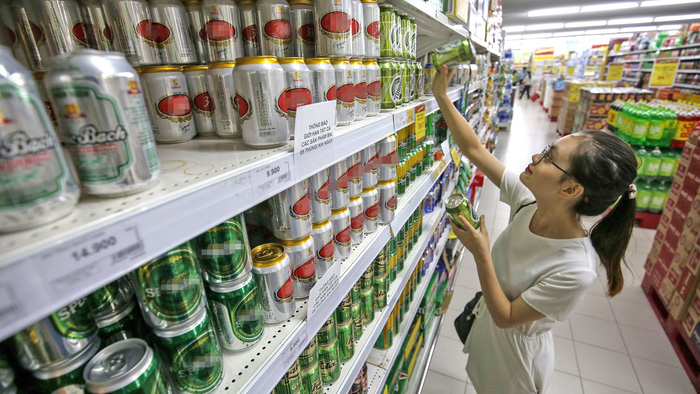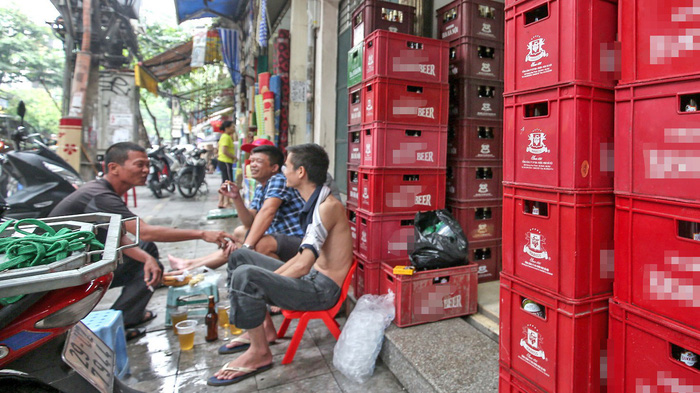Cheap prices, no drinking age limit and sales hour restriction, and unfinished legislation on the prevention of harmful effects of alcohol abuse are the three main reasons behind Vietnam’s rapid advance in the global beer and alcohol consumption rankings.
Middle-income Vietnam managed to jump 30 notches, from 94th in 2010 to 64th in 2016, on the list of the world’s biggest beer-drinking countries, Nguyen Tuan Lam, a WHO advisor for Vietnam, told an event held to discuss a draft decree on preventing alcohol abuse in Hanoi last week.
According to the WHO expert, each Vietnamese consumes an average of 8.3 liters of alcohol per annum, sending the country to the third place in Asia in terms of beer consumption.
Cheaper than milk
In Vietnam, beer is cheaper than milk.
While a 330ml can of beer fetches only VND11,000 (US$0.5), a 170ml bottle of milk already costs VND7,000. This is not to mention bia hoi (draft beer), which is much cheaper.
And beer is also as easy to buy as candy in the Southeast Asian country.
Many grocery store owners said it is normal to sell beer to children and juveniles, as there is currently no regulation on the sale of beer to children as per the Vietnamese law.
Nhung, a shopkeeper of a beverage store on Kha Van Can Street in Thu Duc District, Ho Chi Minh City, said many of her customers looked very young and they appeared to be sent to buy the alcoholic drinks for their families.
“I’m a vendor so I’d sell to anyone who wants to buy my stuff,” she said.
“Why should I care about customers’ age?”
Likewise, Tan, a manager of a drinking place on Le Quang Dinh Street in Go Vap District, said he would sell alcohol at his customers’ request, paying no attention to how old they may be.
“There were even cases when children who went to our place with adults were given beer to drink,” Tan revealed.
The unregulated buying and selling of alcohol has been putting pressure on urban order management forces, according to Tran Viet Lam, from the urban security unit of Ho Chi Minh City’s District 3.
Urban order management officers are only able to fine establishments for occupying the sidewalks, and “a lack of legal frameworks has prevented [them] from handling such issues as underage alcohol drinkers,” Lam admitted.
Under current laws, beer is classified as a common food commodity, therefore subject to the same food safety regulations as non-alcoholic products.
 |
| A consumer picks up a can of beer at a supermarket in Ho Chi Minh City. Photo: Tuoi Tre |
Some experts suggest Vietnam look to other countries, where buying alcohol is strictly regulated, for better management of beer and alcohol consumption.
For instance, a Vietnamese health official recalled trying to buy alcohol during a restricted time period at a supermarket in the U.S., but all attendants strictly followed the rules and turned down his request.
Meanwhile in Thailand, alcoholic beverages are banned from sale during two certain periods every day, or during religious holidays and elections.
Draft decree still under discussion
Vietnam has in fact been preparing a draft decree on preventing the harmful effects of alcohol abuse for ten years.
The final draft of the legislation, expected to address the current policy gaps, is scheduled to be submitted to the lawmaking National Assembly for approval in early 2019.
The draft decree seeks to prohibit the sale of alcohol during specific times of the day, restricting the density of establishments selling alcohol, and banning the sale of alcohol to children.
While these propositions have been embraced by members of the public, as evidenced by the results of several surveys, they always meet with strong opposition from alcoholic drink makers.
Industry insiders express skepticism over the feasibility and practicability of the draft decree, saying the new regulations may affect tourism development.
But it appears that the beer makers are only concerned about their own revenue, which may be hit if the sale and consumption of alcohol in Vietnam are restricted.
Vu Thi Minh Hanh, deputy head of the Health Strategy and Policy Institute, said more attention should be paid to the harmful effects of alcohol abuse than money generated from selling beer.
While the world's alcohol consumption has remained stable, rising from 6.2 liters per person a year to 6.4 liters per person a year after nearly a decade, the figure in Vietnam has jumped from 6.4 liters to 8.3 liters in the same period, Hanh said.
“The harmful effects of alcohol abuse have far outpaced the revenue that alcohol brought to liquor businesses,” Hanh underlined.
As Vietnam has to wait for another year for the bill on preventing and fighting against the harmful effects of alcoholic beverages to be revised and completed, many streets across the country will remain day and night filled with beer shops and the “Cheers” sound of drinking toasts.
Like us on Facebook or follow us on Twitter to get the latest news about Vietnam!



















































